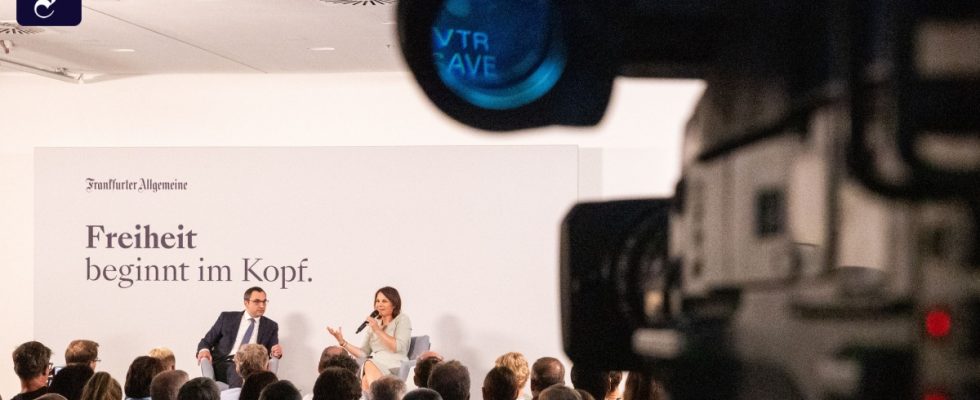fFor Foreign Minister Annalena Baerbock, Tuesday evening begins with a sensitive topic. The Greens politician, who has just returned from New York, is sitting in a well-filled hall in the FAZ Tower in Frankfurt and answering questions from the audience. More than 160 men and women – both older and younger – came to the “FAZ im Dialog” event in Frankfurt’s Europaviertel. Anyone who was unable to get a place on site can follow the discussion via live stream – the evening, moderated by Foreign Policy Chief Nikolas Busse, was fully booked after just 24 hours.
An older listener, who introduces himself as a cultural scientist, wants to know whether their way of promoting “our” women’s and human rights abroad cannot be understood as a form of neocolonialism. On the other hand, people who come to Germany from other countries are hardly ever asked about their attitude towards democracy, he criticizes. This is a “contrast between proselytizing outside and ‘laissez faire’ inside”.
“Good question,” says another listener in the applauding audience – Annalena Baerbock herself obviously doesn’t like her that much. “My brief answer is: No, I think I do exactly the opposite,” she says. Then she takes it a little further. She doesn’t go to other countries to explain “how we actually deal with the world”, but to see how other countries deal with the challenges of the 21st century. The basis for their talks is always the charter of the United Nations – and it is precisely this that shows that it is not about “our” values, but about the universally binding declaration of human rights, to which all states have subscribed. The Foreign Minister also has a different opinion with regard to immigrants in Germany: the German Basic Law, the commitment to democracy and “living together in our country” play a major role in integration courses. “I think it’s really important, and that’s why I didn’t think it was right that cuts were made again, especially in the integration courses after 2019,” said the Foreign Minister.
“So, can I buy a gas heater now or not?”
When it comes to the next question, it’s easier for her. A younger listener asks about “feminist foreign policy”, Baerbock explains the three “R” (rights, representation, resources) and tells a little anecdote from her travels: If you sit across from a delegation full of men, you will hear slogans like these : “Nice that you have taken care of the beauty here in the room”. Your answer is then: “Yes, and fortunately also for a bit of intelligence.” The audience laughs, the mood is relaxed.
On the next topic, Baerbock becomes a little more self-critical. Governments have a responsibility to explain their decisions and make their considerations understandable, she says when asked about the “right leadership”. As a result of Russia’s war of aggression in Ukraine, many people should have learned that “democracy didn’t just fall out of the sky, but that when in doubt we have to learn it every day.” Politicians have to reflect on this – and communicate it to society sufficiently. “I would say self-critically that we’ve lost something,” says Baerbock, because especially since the beginning of the war in Ukraine, “a high stress factor” has been weighing on politics. “The explanations then slipped down a bit.”
A listener who has traveled from Lake Constance and can hardly find his way around topics such as the heating law, euthanasia or electoral law reform also asks for an explanation. “So, can I buy a gas heater now or not?” he asked the Foreign Minister. Baerbock expresses understanding for the criticism – but also calls for understanding for the work of the government: Converting the entire energy supply within a year is “not something that you just do on the side, we have to do it under high pressure . An open-heart operation, so to speak – live in front of the camera.” A constructive discussion of factual issues was not always possible.
A very specific question is also asked by an elderly gentleman who has been committed to German-Czech friendship for years and wants to know why the federal government has canceled subsidies for his projects. Of course, Baerbock can’t give a direct answer to this – but comes to the topic of reconciliation, which she considers “more topical and urgent than ever”. With a view to the Polish demand for reparations, despite all the criticism, one must ask oneself whether enough attention was paid to the suffering of Poles at the time of the Warsaw Uprising. “This is a chapter that is not yet closed and will never be closed,” says Baerbock, because reconciliation work is “always a new task”. This is particularly important with a view to the younger generations, who take many things for granted.
Only towards the end of the approximately 75-minute discussion was the Foreign Minister finally asked about Russia’s war of aggression against Ukraine, which otherwise only plays a marginal role. One listener wants to know how “successful communication” with actors like Vladimir Putin or Sergey Lavrov can be implemented. For the Foreign Minister, the answer is clear: “By ending the brutal Russian war of aggression.”

